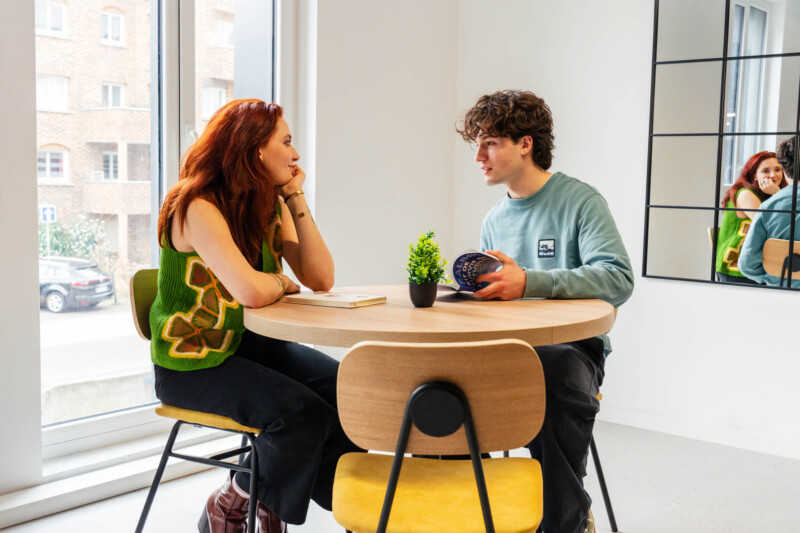Our advice on choosing student accommodation
How do you choose the right student accommodation? It's a question that every student in France faces as they prepare to leave their family home. Finding your first apartment is an essential but often stressful step. Should you choose a student residence, a room with a lodger or a shared flat? What criteria should you take into account? What's the budget? And what steps should you take? We'll give you some valuable advice to help you make the right choice. We'll give you the keys to a worry-free start to your new academic year and student life.

Setting a Realistic Budget for Student Housing
The cost of rent is the number one factor when choosing student accommodation. It’s important to assess all monthly housing expenses, not just the base rent.
Average student rent in France:
-
Student room (14 m²): ~€400/month
-
Studio / T1 (30 m²): ~€500/month
-
T2 (40 m² and up): over €600/month
-
In Paris: €800/month or more for a studio
-
In other cities: ~€450–500/month
Charges to remember :
Housing Assistance:
- APL or ALS: Do a simulation on the CAF website
- Visale Guarantee: Free guarantor service from Action Logement
- Means-tested scholarships (via CROUS)
Several public support schemes can help reduce the cost of student housing.
Financial aid from the CAF, such as APL (Personalized Housing Assistance) or ALS (Social Housing Allowance), is essential for many students. These can significantly lower your monthly rent.
The amount depends on your income, the type of housing, and the location. Be sure to run a personalized simulation on the CAF website before signing a lease.
The Visale Guarantee from Action Logement is a free rental guarantor that replaces the need for a traditional one. It’s available to all students under 30, whether or not you have income—very useful if you don’t have a family guarantor.
Means-tested scholarships from CROUS may also include additional housing support alongside your main grant. Contact your local CROUS office to check the eligibility criteria.
Budget tip: Before signing anything, set up a complete housing budget. It should include rent, utilities (water, electricity, internet), home insurance, and any agency fees. Ideally, your monthly housing expenses should not exceed 30–40% of your total income (scholarship, family support, or student job). Add a 10–15% safety margin for unexpected costs.
Choosing the Right Type of Student Accommodation
There’s no one-size-fits-all solution—just the one that suits your budget, lifestyle, and personal preferences.
Student Residences
Student residences are an increasingly popular choice, especially for those seeking a secure, practical living environment tailored to student life. There are two main types:
University Residences (CROUS)
CROUS housing is the most affordable option on the market, with rents up to 40% lower than in the private sector. It’s a great solution for scholarship holders and low-income students. These small, often furnished units are usually located close to university campuses.
Note: Places are limited and allocated based on social criteria. To apply, you must complete a Student Social File (DSE) between January and May on etudiant.gouv, at the same time as your scholarship request.
Private Student Residences
Private residences—like those in the UXCO Student network—offer modern, comfortable housing with a wide range of included services:
-
Furnished units
-
High-speed Wi-Fi
-
Laundry facilities
-
Gym
-
Shared spaces and coworking areas
-
Events and activities
-
On-site manager to support students
This is an ideal solution for those seeking comfort, independence, and a sense of community, especially in their first year. Rents are higher than in CROUS residences but usually include many charges and services.
Good to know: Many private providers allow you to book online and offer flexible cancellation policies if you’re not accepted through Parcoursup.
Flatsharing (Colocation)
Social and budget-friendly
Requires shared responsibility
Great for cities with high rent (Paris, Lyon, Toulouse, Bordeaux…)
Flatsharing is one of the most popular and economical student housing options, particularly in big cities with high rent. You split the cost of:
-
Rent
-
Utilities
-
Internet
-
Electricity
This results in a lower budget and often a larger living space than you’d get on your own.
However, successful flatsharing requires good communication and mutual respect. You’ll need to agree on house rules, share chores, and get along with your flatmates. A good vibe is essential to avoid conflict.
Flatsharing is perfect for social students who enjoy shared meals, lively chats, and don’t want to live alone. It’s also a great way to make friends when moving to a new city.
Note: Some private student residences now offer turnkey, furnished shared apartments. These include services (Wi-Fi, cleaning, common areas, etc.) to simplify day-to-day management. The UXCO Student Atlas residence, for example, offers shared apartments with up to 10 rooms and terraces of almost 70 m².
Room in a Private Home
- Affordable and welcoming
- Often includes shared meals or access to common areas
- Great for international students
Renting a room in someone’s home is an affordable and sociable option, especially for students on a tight budget or international students. It’s a way to experience local culture, improve language skills, and feel more at home.
You’ll usually have a private furnished room (bed, desk, storage) and access to shared areas like the kitchen, bathroom, and living room. Some hosts even offer half-board (breakfasts or dinners), and some reduce rent in exchange for small services like tutoring, babysitting, or just being present.
This setup encourages integration, intergenerational exchange, and a sense of security. Rental contracts are often shorter and more flexible than traditional leases.
Private Studio / T1 Apartment
- Full independence
- More expensive, but more privacy
- Best if you value peace and quiet
Renting a studio or T1 (one-room apartment) gives you complete autonomy. It’s often the most expensive option, but it also provides the most freedom and privacy—no roommates, no shared spaces, no noise.
This type of accommodation is ideal if you prefer to live alone, follow your own routine, or need a quiet space to study and recharge.
Choosing the Right Location for Your Student Housing
A cheaper apartment on the edge of town might end up costing you more—in time and transport. Make sure to consider:
-
Distance from your university, campus, or school
-
Public transportation nearby (bus, tram, metro)
-
Essential services within walking distance (grocery store, pharmacy)
-
Neighborhood vibe (quiet, lively, student-friendly…)
Tip: Spend time on Google Maps, check neighborhood reviews and browse local student forums. It’s a great way to get a feel for the area around your future home—and to estimate how long it will take you to get from your student apartment to campus.
Start Early and Plan Ahead
When should you start?
The ideal time to begin your search is between April and June.
Many tenants give their notice around this period, so there are more listings available.
Where to look?
-
Specialized websites: Lokaviz, Studapart, Adele, SeLoger, LeBonCoin
-
Secure platforms with sometimes virtual tours and guarantees : Ecla, UXCO Student, …
-
Facebook groups for students or local student associations
Tip: Set up alerts on these platforms to make sure you don’t miss any new listings that match your criteria.
Prepare a Complete Rental Application
In a competitive housing market, a strong rental file can make all the difference.
Required documents (according to the 2015 decree):
For the student:
-
ID card or residence permit
-
Student card or proof of enrollment
-
Proof of current address
-
Proof of income (tax notice, scholarship certificate, payslips, etc.)
For the guarantor:
-
ID card
-
Last three payslips
-
Most recent tax notice
-
Proof of address
Tip: Use DossierFacile to create a certified digital rental file approved by the French government.
Visit Before Committing (Physically or Virtually)
While virtual tours are becoming more common, an in-person visit is still the best option when possible. During the visit, make sure to check:
-
The condition of walls, floors, and ceilings
-
Water pressure and ventilation
-
Any signs of dampness or mold
-
Noise levels (traffic, neighbors…)
-
The functionality of equipment (heaters, windows, electrical outlets)
Don’t forget: The move-in inspection (état des lieux d’entrée) is mandatory and must be done in the presence of the landlord or their representative.
Read and Understand the Rental Agreement
Your rental contract (bail d’habitation) must include:
-
The amount of rent, charges, and security deposit
-
A detailed description of the property
-
The duration of the lease (1 year for furnished rentals, 3 years for unfurnished)
-
The termination and notice conditions
-
Mandatory technical reports (energy performance, gas, electricity, noise, etc.)
Important: The landlord is not allowed to request certain documents, such as a photo, bank account details (RIB), or a statement confirming you have no outstanding loans.
Know Your Rights and Responsibilities as a Tenant
As a tenant, you have rights, but also duties:
Your Rights:
-
A decent and well-maintained home
-
The right to peaceful enjoyment (no unauthorized visits from the landlord)
-
Protection against rental discrimination
-
The right to energy compliance – since 2025, properties with an energy rating of F or G can no longer be rented
Your Responsibilities:
-
Pay rent and charges on the agreed date
-
Take out renter’s insurance
-
Use the property respectfully (peaceful use, regular maintenance)
-
Report any damage or malfunctions to the landlord promptly
In Summary: 6 Key Tips for Choosing the Right Student Housing
Find out more
Looking for all-inclusive, furnished, conveniently located student accommodation?
Discover UXCO Student residences in major French cities → See UXCO Student residences
FAQ
The most budget-friendly student housing option remains the CROUS university residence, with rents up to 40% lower than standard market prices. Allocation is based on social criteria, via the Student Social File (DSE).
In second place, private student residences offer furnished units with included services (Wi-Fi, laundry, common areas). While the rent is higher than CROUS housing, it’s often all-inclusive, making it easier to manage your monthly budget.
To get student housing, different criteria apply depending on the type of accommodation:
-
In CROUS residences: Selection is based on social criteria such as parental income, scholarship status, and distance from home.
-
In the private sector: You’ll need a complete rental application including an ID, proof of enrollment, guarantor details, and evidence of financial resources.
Some support schemes, like the Visale Guarantee, make it easier to rent without a personal guarantor.
A typical student apartment is usually furnished and compact, and includes:
-
A main room with a bed, desk, and wardrobe
-
An equipped kitchenette (hotplates, fridge, microwave)
-
A private or shared bathroom, depending on the residence or flatshare
In student residences like those offered by UXCO Student, you may also have access to shared facilities such as a gym, coworking spaces, or a communal kitchen.
The best time to search for student housing is between April and June. This is when most tenants give notice for a summer move-out, resulting in the highest number of available listings.
Waiting until summer can mean fewer options and more competition, making it harder to find the right place.
Ideally, you should book your student housing between April and July, especially in major university cities.
In private residences like UXCO Student, it’s possible to reserve as early as spring, with flexible cancellation optionsif you’re not admitted through Parcoursup.
For CROUS housing, applications are made through the Student Social File (DSE), which must be submitted between January and May.




